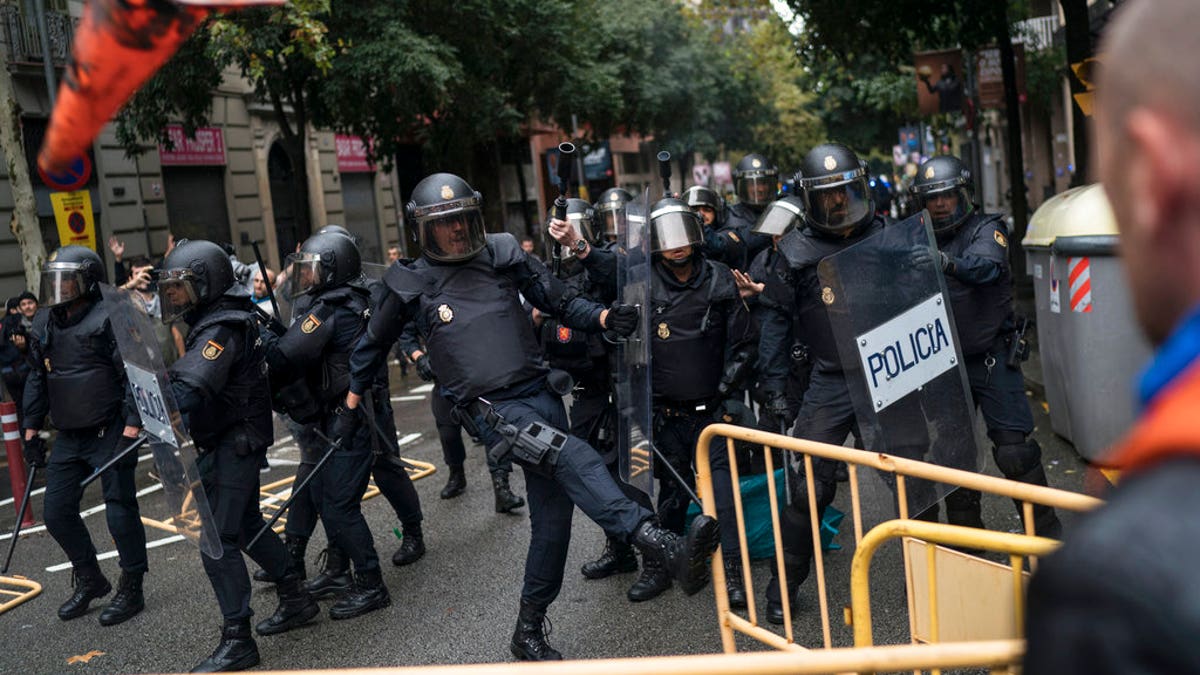
Spanish riot police removes fences thrown by people to them as they try to prevent people from reaching a voting site at a school assigned to be a polling station by the Catalan government in Barcelona, Spain, Sunday, 1 Oct. 2017. Catalan pro-referendum supporters vowed Saturday to ignore a police ultimatum to leave the schools they are occupying to use in a vote seeking independence from Spain. (AP Photo/Felipe Dana) (Copyright 2017 The Associated Press. All rights reserved.)
Barcelona -- Spain held an election Sunday. Nobody won.
Instead, the central government in Madrid and the seething northeastern province of Catalonia can each now claim some dubious moral victory, and dispute each other’s boasts of having accomplished what they set out to do.
For Catalans who had hoped to use 1-O (the first of October) to declare independence from Spain, it was a bitter day of elation turned into frustration. Tens of thousands of them were able to cast ballots, but they will never know just what percentage of their neighbors agree with their desire to form a separate country in Europe.
That’s because the National Police, on the orders of the government in Madrid, stormed some balloting places – schools among other locations – smashed windows to gain entry, confiscated ballot boxes, and refused to let other would-be voters in to make their choice known.
Fortunately, there was no reported loss of life, though more than 300 people are said to have been injured – mostly by club-swinging cops and rubber bullets fired by the National Police to disperse pro-independence protesters. A dozen or so police were also reported injured.
In cities around the rest of Spain, citizens hung the national flag on their balconies and terraces to send a message of unity.
The leader of the independence movement, Carles Puigdemont, declared that just having some voters successfully cast ballots was a victory for his cause. That’s like playing poker against yourself and claiming you were dealt an inside straight.
Of course, the election was not sanctioned by any body outside of Catalonia. And only Catalans were permitted to vote, even though the question of independence affects all of Spain, not to mention Europe itself.
The Spanish government, for its part, could hardly have recognized the results of a regional vote that its own courts had ruled invalid. In cities around the rest of Spain, citizens hung the national flag on their balconies and terraces to send a message of unity. That’s good.
But using armed force to subdue voters will only heighten tensions among Catalans, who correctly grouse that their culture, history and language are not given adequate respect. They also resent that their taxes are going to subsidize other parts of Spain that don’t contribute as much to the economy as they do. They too, have a point.
There’s a lesson in Sunday’s events to the rest of Europe and the world (and perhaps especially the United States). No matter how much you disagree with your neighbor, listen to him or her. There might just be a way to work out your differences without bloodshed. Or even bitterness.




















